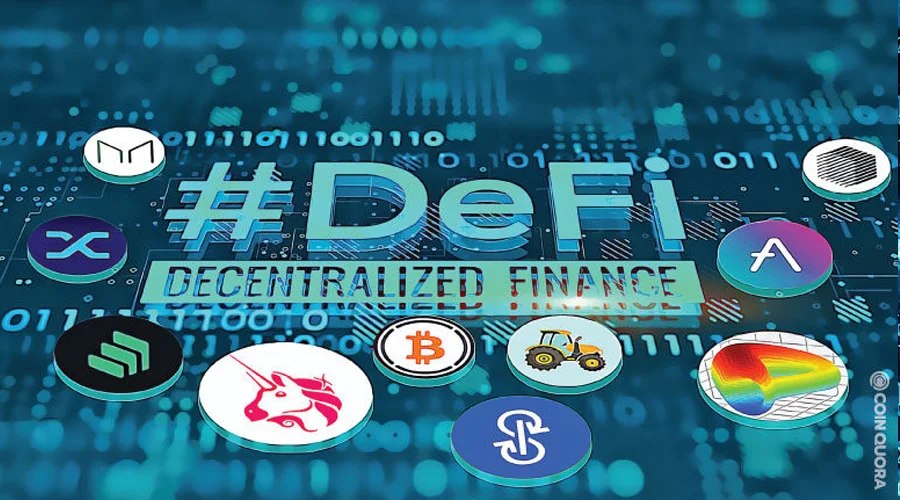“Decentralized Finance (DeFi): Transforming Finance Through Decentralization”
Introduction:
In a financial world traditionally dominated by banks, intermediaries, and centralized institutions, a revolutionary movement has emerged: Decentralized Finance, or DeFi. Built on the principles of blockchain technology and the ethos of decentralization, DeFi is reshaping the financial landscape by providing open, accessible, and innovative financial services. This article delves into the exciting world of DeFi, exploring its core concepts, benefits, challenges, and potential to democratize finance for everyone.

Demystifying DeFi:
At its core, DeFi is a financial ecosystem that operates on blockchain technology, primarily Ethereum, to recreate and enhance traditional financial services without intermediaries. Key components of DeFi include:
- Smart Contracts: DeFi platforms rely on self-executing smart contracts that automatically enforce agreements and eliminate the need for intermediaries like banks.
- Decentralization: DeFi applications are hosted on decentralized networks, ensuring that control is distributed among network participants rather than concentrated in a central authority.
- Open-Source: DeFi projects are typically open-source, allowing anyone to inspect the code, participate in development, and contribute to the ecosystem.
- Interoperability: Many DeFi projects are designed to work together, enabling seamless integration between different services and platforms.
Benefits of DeFi:
Defi offers numerous advantages over traditional finance:
- Accessibility: DeFi is open to anyone with an internet connection, offering financial services to the unbanked and underbanked populations worldwide.
- Transparency: All transactions on the blockchain are transparent and immutable, enhancing trust and reducing the risk of fraud.
- Lower Costs: By eliminating intermediaries, DeFi reduces fees and transaction costs associated with traditional banking services.
- Speed and Efficiency: DeFi transactions occur in real-time, allowing for rapid access to funds and quick settlements.
- Financial Inclusion: DeFi enables access to financial services like lending, borrowing, and trading for individuals and businesses that were previously excluded from the traditional financial system.
Challenges and Risks:
While DeFi holds immense promise, it is not without challenges and risks:
- Security: DeFi platforms are susceptible to smart contract vulnerabilities and security breaches, leading to substantial financial losses.
- Regulatory Uncertainty: The regulatory landscape for DeFi is evolving, and some projects may face legal challenges in different jurisdictions.
- Lack of Consumer Protections: DeFi lacks traditional consumer protections, and users must exercise caution and due diligence.
- Scalability: Scalability issues on the Ethereum network have led to congestion and high gas fees, affecting the usability of DeFi platforms.
- Volatility: DeFi tokens and assets can be highly volatile, posing risks to investors and users.
The Expanding DeFi Ecosystem:
The DeFi ecosystem is rapidly expanding, with a growing number of applications and use cases:
- Decentralized Exchanges (DEXs): DEXs like Uniswap and SushiSwap facilitate peer-to-peer trading of cryptocurrencies without intermediaries.
- Lending and Borrowing: Platforms like Aave and Compound enable users to lend their assets and earn interest or borrow assets using collateral.
- Stablecoins: Stablecoins like USDC and DAI provide stability in a volatile cryptocurrency market, making them valuable for everyday transactions.
- Derivatives: DeFi derivatives platforms offer instruments like futures and options for risk management and speculation.
- Asset Management: DeFi offers decentralized asset management platforms where users can earn yields by staking their assets.
Conclusion:
Decentralized Finance (DeFi) is more than just a buzzword; it represents a fundamental shift in the way financial services are conceived, accessed, and executed. By leveraging the power of blockchain technology and decentralization, DeFi is opening the doors to a new era of financial inclusion, accessibility, and innovation. While it faces challenges and regulatory scrutiny, the growing ecosystem and its potential to empower individuals and disrupt the status quo make DeFi one of the most exciting developments in finance today. As it continues to evolve, DeFi has the potential to reshape the global financial landscape, providing financial autonomy and security to individuals worldwide.